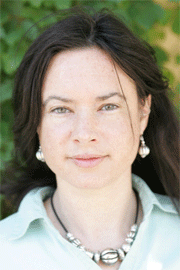Interview with Kimby Caplan, Film Maker and Director
Share:
Topic: Silence Can Be Deafening
 Beck: Good Morning Kimby. Thanks for your time this morning.
Beck: Good Morning Kimby. Thanks for your time this morning.Caplan: Hi Dr. Beck, thanks for the invitation.
Beck: Kimby, if you wouldn't mind, I'd like you to start with you telling me a little about your history as a deaf person, growing up in a hearing world?
Caplan: I was an only child, so my parents had nothing to compare me too! I was "diagnosed" at 1.5 years old by my grandmother. She noticed I wasn't responding to the vacuum cleaner, and she thought something was up. There was no previously known hearing loss or deafness in our family.
Beck: Was there a defining moment during your school years, when you said to yourself ... "I am different."
Caplan: I always knew I was different. The songs the other children sang, the rules to the games, even what they learned when the teacher stood at the black board, not facing the room, all these things added to my extreme loneliness.
Beck: How did you get through it?
Caplan: To cope and manage these situations, I focused on the visual aspects of the world around me. I substituted visual stimulation and interaction with my surroundings, for friends and auditory comprehension, which I did not have.
Beck: Please tell me how you developed speech and language skills? How difficult was that?
Caplan: Speech and language skills were very difficult. I have to thank my parents and Doreen Pollack for that. They're the ones who pushed and pulled me. They used endless repetitions of sounds and words, and played with me, trying to make everyday activities speech and sound oriented -- and somewhat fun. It was, and still is, a never-ending challenge for me to cultivate my speech.
Beck: If you could tell the audiologists and speech language pathologists, the single most important thing about teaching speech and language skills to deaf children.... What would that be?
Caplan: Teach through genuine warmth, concern and care for the child. For me, audiologists and speech language professionals were "big" people. They were warm and fun, and they made me want to do well. They encouraged me in a safe and nurturing environment, to go ahead with the tedious repetitions required to develop speech and language skills. Developing the beautiful speech I have is an ongoing exercise in listening, and loving the sounds I hear while striving to "fill in the blanks."
Beck: When did you first wear hearing aids and what was that like?
Caplan: I was just under 2 years old, it was more than 25 years ago. The hearing aids back then made sounds that hurt, and they rubbed my ears and head. It wasn't great, and I certainly didn't enjoy them. I know the hearing aids available today are so much better, but even the unpleasant ones I had, allowed me to learn speech sounds and develop language skills.
Beck: Please tell me about your formal education?
Caplan: I earned my BFA in Film Studies, from the University of Colorado in 1999. I earned my MA in Cinema-Television, from Southern Methodist University, graduated in 2004, and I am working towards my MFA from the American Film Institute beginning this fall (2005).
Beck: How did you get into film-making? What was it about film making that captured your interest?
Caplan: As I said earlier, I am very visual. Early on, I thought photography made sense for me, but then as time went on, I thought I needed something with movement, and film was the next step.
Beck: When did you make the film "Listen?"
Caplan: I started in 2003 and finished in 2005.
Beck: I did view the entire film and I understand why it was nominated, and subsequently won
an Academy Award. Please tell me about the award?
Caplan: The award is a way for the Academy to honor student filmmakers who don't have the same resources as professionals. The process put me in contact with amazing film makers, and it has been a wonderful experience. The award is very heavy, like a giant black paperweight with the Oscar emblem molded to one side, and so to me, it represents a responsibility to continue towards excellence.
Beck: I thought the film was emotionally powerful, but there were a few film clips and scenes that were fairly disturbing. What do you say to viewers that tell you you went "too far?"
Caplan: The reality is that deaf and hearing impaired children feel too much pain, confusion and isolation. Ultimately, I believe mainstream social expectations of "normalcy" have gone too far!
Beck: Do you have any advice for other young people growing up as deaf or hearing impaired
in a hearing world?
Caplan: Love yourself. Focus on what is "unique" about you, not what is "different." Do everything you can to feel beautiful and special in a socially contributory way. Survive, because better days, and days of more understanding will come -- but only if you believe in them, and fight for them.
Beck: What about advice for family members?
Caplan: Love, support and nurture your children -- and believe they will capture the moon! But know that deaf children have difficulties which hearing people cannot understand. Such as being totally exhausted by the daily struggle to utilize what little hearing there may be, leaving very little strength to interact. Realize that silence brings a loneliness that is louder than words could ever be, and that joy is the greatest way to fill the void. At the same time, do not over-protect your child. They must be prepared for the reality of who they are, their limitations. Lastly, be practical, accepting and humorous.
Beck: What are your thoughts on assistive listening devices (ALDs) ?
Caplan: ALDs certainly help when fit properly, and if the the wearer is attentive to not accidentally rub the microphone too much along their clothing! However, ALDs can be a pain, because you only hear the one person wearing the mic, and for me, ALDs have never been powerful enough.
Beck: What about hearing aids?
Caplan: I love my hearing aid, and in fact, my left hearing aid is my friend. I stopped wearing an aid in my right ear when I was 12. I was mainstreamed in school, and so having left ear sound is the only world I know, and I feel a sense of belonging to/with it. I hope to use my hearing aid for many more good years to come.
Beck: Kimby, what are your thoughts on cochlear implants?
Caplan: I am not a cochlear implant recipient, so my thoughts are still in germination. I believe they certainly help, and they certainly require enormous rehabilitation time, just like wearing hearing aids. I hope they continue to improve and enhance lives.
Beck: Thanks so much Kimby. It's been wonderful getting to know you a little, and I thank you for your time this morning.
Caplan: Thank-you Dr. Beck!
"For more information, or to order a copy of LISTEN,
please e-mail to: kimbycap74@yahoo.com "

